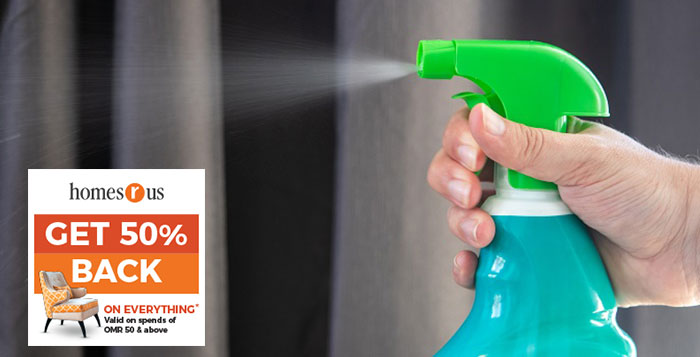
Muscat: Medical professionals in Oman have advised parents to make sure their children do not put hand sanitiser lotions into their eyes, either accidentally or on purpose, because the harm it causes them might be irreversible.
With sanitiser bottles a relatively new concept in many homes, having only been bought in large numbers since the start of the COVID-19 pandemic, small children might not be fully aware as to what happens if they mishandle the contents within.
If they enter the eye, says Dr Sudha Ramesh, an ophthalmologist at NMC Healthcare, they could damage the surface of the eye, cause burning, or even affect a person’s vision by forming a cloudy layer over the cornea of the eye.
“The chemicals in hand sanitisers make them mildly toxic to the eye, and the main effect of this is severe burning and redness,” she said.
“The moment you know the sanitiser lotion has gotten into your eye, apply cool water to the affected area, and continue to wash it until you reach the hospital. If you administer first aid, then by the time you get here, we will be able to help you,” said Dr Sudha Ramesh.
Ramesh did say she had come across a few patients who did need medical assistance because they had squirted sanitisers into their eyes.
Cases like these are often treated through eye washing, drops, and medicines.
“Patients who treat themselves properly and then come to us recover within a very short time,” she explained.
“However, those who fail to follow proper first aid are only risking further harm. Depending on which area of the eye the sanitiser affects, the consequences can vary. If it affects your cornea, for example, your vision might get cloudy or blurred.”
“It is worse if you don’t take care of your eyes properly and they are not healthy, because then, the cloudiness will persist and permanently affect your vision,” she said.
“It won’t lead to blindness, but you are definitely risking your eyesight under such conditions. Parents must make sure they advise their children on how to use sanitisers, because they are too small to know on their own.”
Anuya Phule, a psychotherapist at Hatat Polyclinic, is herself the mother of two small children, the younger of who loves playing with sanitiser bottles, sometimes squirting so much of it that he empties several of them in a day.
For children to seek out something that is different or unusual from the normal is part of their behaviour, she explains, which makes it all the more important for parents to keep a keen eye on them, and restrict access to items such as these that are potentially harmful.
“Children are used to washing their hands with water, but for them, hand sanitisers are something new,” she said.
“This after all feels different, is cool to the touch, and evaporates quickly. Many young children have never experienced something like this. They have the same fascination with creams, because they feel so different.
“Their inquisitiveness means they often seek out those items that feel or taste different from the norm, so parents need to keep a watchful eye on their young ones…their curiosity is a natural part of growing up,” added Phule.
Recently, at the Cleveland Clinic in Abu Dhabi, the capital of Oman’s neighbouring United Arab Emirates, doctors were required to perform surgery on the eye of a four-year-old girl after she inadvertently squirted a large amount of sanitiser into it.
The accident occurred when the child activated a foot-operated hand sanitiser station installed in a public place that she was visiting with her family and got hand sanitiser gel in her eye.
When she pressed the pedal of the dispenser, the hand sanitizer didn’t fall downwards, but instead, a large amount went straight into her eye and she began screaming in pain.
The child presented to Cleveland Clinic Abu Dhabi with extreme pain and inability to open her eye.
Doctors immediately washed the solution from the child’s eye, administered antibiotics to prevent infection and pain drops to reduce discomfort.
She was diagnosed with a near total corneal abrasion caused by the alcohol and alkaline chemical additives in the hand gel. When the pain continued to escalate despite close follow-up over the following days by caregivers from Cleveland Clinic Abu Dhabi’s Eye Institute, the child was taken to the operating room where doctors evaluated her eye under anesthesia and placed a self-retaining amniotic membrane, or biological bandage used to heal large non-healing corneal abrasions.
“Hand sanitiser dispensers installed in public spaces are often at waist-level for adults but this means that they are at eye-level for children,” said Dr Brian Armstrong, staff physician at Cleveland Clinic, who was part of the care team assigned to the young patient.
“With this child, the pain may have increased over time as the alkaline solution penetrated deeper into her cornea,” he added.
“Immediate irrigation is advised in these cases, and manual opening of the eye may be required. It is important to irrigate away from the unaffected eye to prevent any further damage,” he explained.
“This is the kind of injury we would typically see among workers who are exposed to toxic materials or a chemical spill on a worksite. Delayed treatment of such injuries can have even worse repercussions in children compared to adults because their vision is still developing at such a young age. The risk of amblyopia, where vision fails to develop properly, is much higher at this age. The likelihood of complications following corneal transplantation, if necessary, is also much higher at this age.”